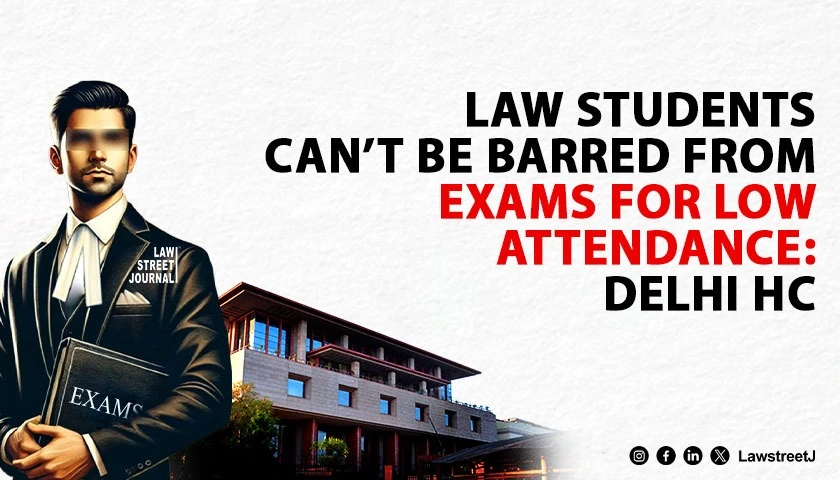New Delhi: The Delhi High Court has issued comprehensive guidelines reforming legal education in India, directing the Bar Council of India (BCI) to reconsider mandatory attendance requirements and emphasizing the need for robust grievance-redressal mechanisms in educational institutions.
Justice Prathiba M. Singh and Justice Amit Sharma delivered extensive observations on the rigid nature of attendance norms and their impact on students’ mental health while hearing a case arising from the tragic suicide of a law student.
The court was addressing W.P. (CRL) 793/2017, which stemmed from the death of Sushant Rohilla, a student of Amity Law School, who died by suicide on August 10, 2016. The petition originated from a letter written by Raghav Sharma, a friend of the deceased student, to the then Chief Justice of India alleging that Sushant was subjected to mental torture and harassment and was forced to repeat an academic year due to his inability to meet the 75% attendance requirement prescribed by GGSIPU.
The Supreme Court initially considered the matter and appointed Senior Advocate F.S. Nariman to assist. On March 6, 2017, the matter was transferred to the Delhi High Court with the direction: “Let this writ petition be transferred to the Delhi High Court, to be heard and decided on merits in accordance with law.”
Justice Prathiba M. Singh expressed serious concerns about inflexible attendance rules, stating:
“Consequences of non-appearance in examination and hence detention, which is prescribed as the first and the only consequence of lack of attendance, reveals an extremely non-pragmatic approach towards the study of law.”
Emphasizing the multidimensional nature of legal education, the court observed:
“The study of law has various dimensions — knowledge of the law, practical application of the law, and implementation of the law.”
The bench strongly criticized Rule 12 of the Legal Education Rules, 2008, stating that the attendance mandate was inconsistent with the National Education Policy (NEP) 2020.
Also Watch
Justice Singh further remarked:
“Such stringent rules that significantly hamper the mental health of young students, leading to drastic steps such as suicides, would in fact impinge upon the right to life itself.”
The court also highlighted the irony in rigid attendance enforcement despite institutions’ inability to meet quality requirements prescribed under Rule 10.
On biometric attendance mandated by BCI, the court noted:
“Biometric attendance systems and CCTV cameras would be extremely invasive of the privacy and rights of students.”
The court underscored the importance of practical training, observing the value of visits to legal aid clinics, prisons, juvenile homes, and courts at every level.
Regarding grievance-redressal, the court directed that committees must consist of at least 50% full-time student members.
Issuing interim directions, the court ordered:
“No student enrolled in any recognised law college, university or institution in India shall be detained from taking examinations or prevented from further academic pursuits or career progression on the ground of lack of minimum attendance.”
The court permitted grade reduction of up to 5% as a consequence for shortage of attendance, rather than detention or exam-bar.
It also stayed BCI Circular No. BCI:D:5186/2024 dated September 24, 2024 mandating biometric attendance and CCTV systems.
BCI has further been directed to publish lists of advocates, law firms, and institutions willing to provide internships, prioritising economically weaker students and those from remote regions.
Acknowledging modern learning methods, the court observed:
“In today’s time, online education and digital learning platforms enable students to conceptually understand subjects through diverse modes of learning.”
The bench commended the courage of the deceased student’s family, noting their persistent efforts in pursuing reform in legal education.
Case Title: Court on its Own Motion in Re: Suicide Committed by Sushant Rohilla, Law Student of I.P. University vs Respondents



![Delhi High Court Sets Aside Arbitral Tribunal's Award Against NHAI in Highway Project Delay Case [Read Judgment]](/secure/uploads/2023/07/lj_9605_23374c2e-392c-4491-a2fe-f2f12fc5272f.jpg)
![Delhi Court Rejects Stay Request in Defamation Case Against Rajasthan CM Ashok Gehlot [Read Order]](/secure/uploads/2023/08/lj_5208_80de1ddc-d76a-4f7f-b180-408e3ae14fb4.jpg)







